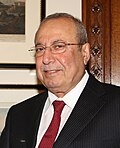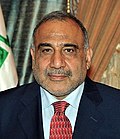| Vice President of the Republic of Iraq | |
|---|---|
 | |
Incumbent since 2 October 2018Vacant | |
| Style | His Excellency |
| Appointer | Parliamentary vote on the names submitted by the President [1] |
| Term length | Four years |
| Formation | 14 July 1958 10 October 2016 (restored) |
| Salary | 122,400 USD annually [2] |
 |
|---|
|
| Constitution |
Iraq has had three vice presidents or deputy presidents serving concurrently. [2]
Contents
- List of officeholders
- Under Iraqi Republic and Ba'athist Iraq
- Republic of Iraq since 2004
- Timeline
- See also
- References
The office of Vice President was historically largely ceremonial but prestigious. In post-war Iraq, the Constitution of Iraq, in its "Transitional Guidelines," creates a three-member presidency (or presidential) council, consisting of the president of Iraq and two deputy presidents, who must act in unison. The presidency council had three members to accommodate Iraq's three largest groups: Sunni Muslim Arabs, Shiite Muslim Arabs, and the mostly Sunni Kurds. As a unit, the Presidency Council was meant to symbolize the unity of the nation. This arrangement is required by the constitution to continue until the Council of Representatives, enters its second set of sessions. At this point, the Presidency Council would be replaced by a solitary President of the Republic, who would have only one deputy, the vice-president. In any case, the Presidency is appointed by the Council of Representatives. The three-member arrangement was a hold-over from the Iraqi Interim Government and the Iraqi Transitional Government.
In September 2014, three new vice presidents were elected: former prime ministers Nouri al-Maliki and Ayad Allawi and former speaker of Parliament Osama al-Nujaifi. [3]
On August 11, 2015, the Council of Representatives approved the plan proposed by the al Abadi government to eliminate the positions of vice president and deputy prime minister. [4] However, this decision was met with opposition, and Osama al-Nujaifi filed a constitutional complaint. Nuri al-Maliki also expressed his determination to retain his position. [5] [6]
On October 10, 2016, Federal Supreme Court of Iraq of Iraq ruled that the abolition of the three vice president posts was unconstitutional. [7] Consequently, the positions were reinstated.
However, since October 2, 2018, the three vice president posts have remained vacant.















